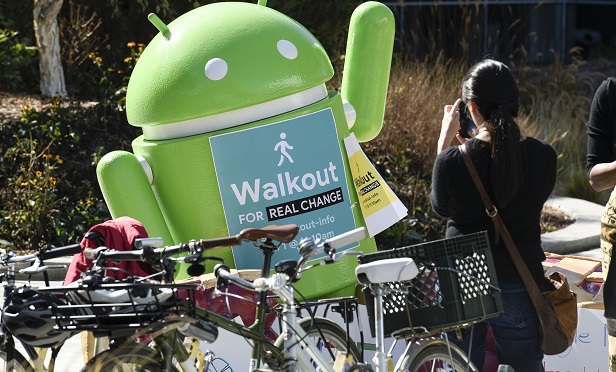 The Google employees who walkedout were taking a public, collective stand in the broaderconversation about sexual harassment. (Photo: MichaelShort/Bloomberg)
The Google employees who walkedout were taking a public, collective stand in the broaderconversation about sexual harassment. (Photo: MichaelShort/Bloomberg)
The global walkout by Google workers, a response to AlphabetInc.'s reported protection of executives accused of sexual misconduct, may be a harbinger ofsomething new in employer-employee relations: empowered workers'moral-political protest directed as much against the general culture as against management.
|Although the walkout is connected in a broad sense to workplaceconditions, this isn't the trade union strike of old. Google's workers aremainly professionals: engineers, not laborers. They have well-paid,high-prestige jobs at a company known for recruiting top employees.Not all of the thousands of workers who walked out were personalvictims of workplace sexual harassment.
|Related: Would employees quit over genderinequality?
|Nor did the signs and slogans associated with the walkoutsuggest that Google's workers feel oppressed as a class. Theprotest, in sum, was not about the classic struggle of laboragainst capital or oppressive management.
|Rather, the Google walkout seems to have been about values,specifically the value of moral condemnation of workplace sexualharassment. The precipitating event wasn't, say, reports detailingthat there have been widespread instances of sexual harassment atthe company. That seems to have been the motivating force behindthe McDonald's global walkout in September.
|The news that fueled the Google walkout was the New York Timesreport that the company had protected a series of very senior menassociated with the company and accused of inappropriate sexualconduct connected to the workplace, offering them lucrativeseverance packages or keeping them on.
|The charges resonated with the #MeToo movement. The walkouttherefore needs to be understood partly in that specific context.Google's employees were signaling to management that they feelserious unhappiness with the corporate and general culture in whichthe instances of harassment occurred and were, essentially, coveredup.
|Google's sophisticated employees understood that their walkoutwould be covered in news media worldwide. They probably alsounderstood that the Times story on its own would motivateAlphabet's senior leadership to change internal sexual harassmentpolicies.
|The employees were therefore doing more than requestingworkplace changes like the dropping of mandatory arbitration forcontract-related disputes, or that the company's chief diversityofficer report directly to Chief Executive Officer SundarPichai.
|The Google employees who walked out were taking a public,collective stand in the broader conversation about sexualharassment. They were able to make that statement in part becausethey were Google employees, whose actions would make news and whosecultural prestige put significant weight into their protest.
|Management seems to have interpreted the protest in this way. Inan email, Pichai acknowledged that the problem of harassment “hadpersisted for far too long in our society.” And he promised hisemployees “the support you need” in connection with the walkout. Inessence, Pichai was trying to get behind the walkout. That may havebeen clever corporate management, but it was also a recognitionthat the walkout did not need to be interpreted as criticism ofAlphabet so much as an act of societal protest.
|This aspiration on the part of employees to take collectiveaction in furtherance of global political goals is, I think, new inan important sense.
|To be sure, it is part of to a growing trend among techcompanies for employee petitions protesting policies the employeesdon't like.
|But Google's employees are going a step further with theirwalkout. And the accommodating response from management maycontribute to it.
|In the future, it's possible to imagine employees at othercompanies staging similar walkouts. The immediate impetus may beupsetting news about their own companies.
|But that's not even necessary. One can easily imagine, forexample, employees at other tech companies staging future walkoutsin solidarity with the Google employees – even withoutprecipitating events at their own companies.
|The most apt analogy may be student walkouts and protests, whichdon't necessarily reflect dissatisfaction with their owneducational institutions. The national student walkout over guncontrol in March is a good example.
|If students can walk out over an important political-moral issuewith solidarity and support from many of their teachers, there isno reason employees can't do the same.
|Unlike the general strikes of the 1920s, the goal of suchsymbolic walkouts wouldn't be to paralyze industry in order to winimportant structural victories for workers as workers. There wouldbe relatively little economic cost, if any. As a consequence,management in the future might well support the walkouts, the wayschool administrators frequently do.
|The consequence for companies whose employees walk out in a showof political-moral solidarity with some national or internationalissue is rather that the company may come to be identified with aparticular political position. When that position is sufficientlyuniversal, or doesn't harm the company in some consumer market, oris strongly shared by management, there is reason to expectmanagement acquiescence.
|Things would be much trickier for management if employees weretaking positions that the companies don't want to associate withthemselves. But that would probably represent a different stage inthe possible future development of this new practice.
|Read more:
- Is your company culture undermining employeeproductivity?
- 6 tips for improving companyculture
- People, processes and culture: The most importantparts of a business
Noah Feldman is a Bloomberg Opinioncolumnist. He is a professor of law at Harvard University and was aclerk to U.S. Supreme Court Justice David Souter. His books include“The Three Lives of James Madison: Genius, Partisan, President.”This column does not necessarily reflect the opinion of theeditorial board or Bloomberg LP and its owners.
|Copyright 2018 Bloomberg. All rightsreserved. This material may not be published, broadcast, rewritten,or redistributed.
Complete your profile to continue reading and get FREE access to BenefitsPRO, part of your ALM digital membership.
Your access to unlimited BenefitsPRO content isn’t changing.
Once you are an ALM digital member, you’ll receive:
- Critical BenefitsPRO information including cutting edge post-reform success strategies, access to educational webcasts and videos, resources from industry leaders, and informative Newsletters.
- Exclusive discounts on ALM, BenefitsPRO magazine and BenefitsPRO.com events
- Access to other award-winning ALM websites including ThinkAdvisor.com and Law.com
Already have an account? Sign In
© 2024 ALM Global, LLC, All Rights Reserved. Request academic re-use from www.copyright.com. All other uses, submit a request to [email protected]. For more information visit Asset & Logo Licensing.








